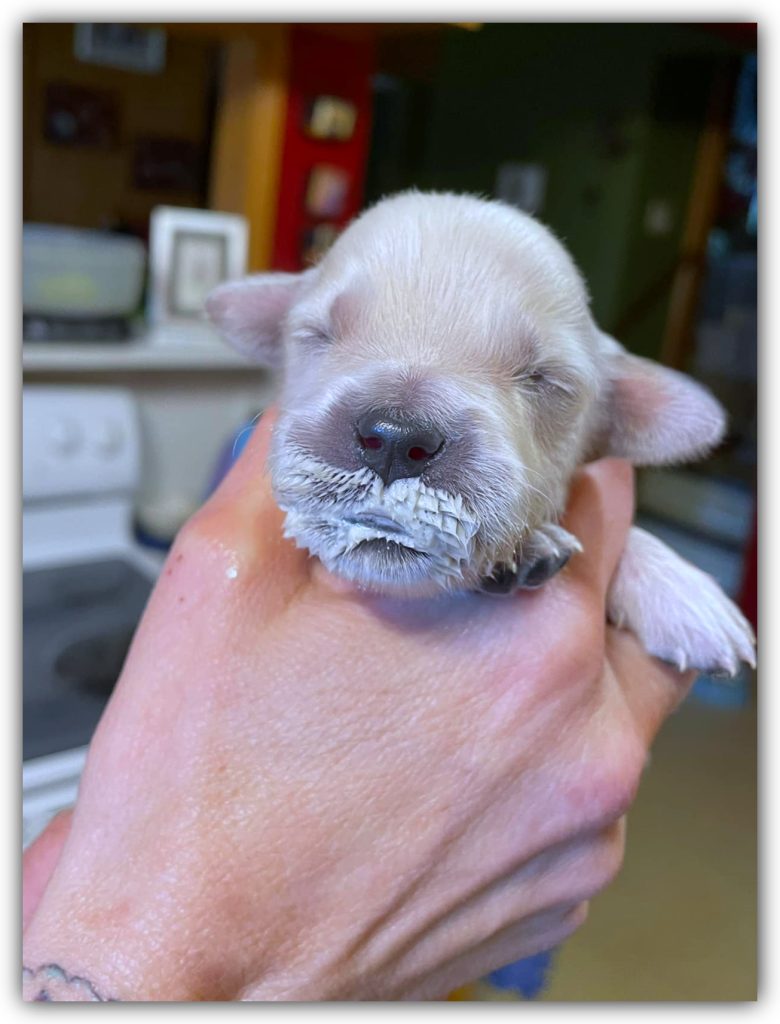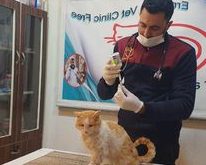Importance of Proper Nutrition for Puppies
The journey of raising a puppy is a magical one, and at its heart lies the importance of providing the right nutrition. Just as a seed needs nourishing soil to grow into a mighty tree, a puppy needs proper food to grow into a healthy and happy dog.

The Challenge of Feeding a Feed a 5 Week Old Puppy without Mom
Imagine a tiny ball of fur, barely five weeks old, separated from the comfort of its mother’s care. This marks the beginning of a unique challenge – ensuring that this little one gets all the nourishment it needs to thrive.
What to Feed a 5 Week Old Puppy without Mom?
Puppy Formula Options
Commercial Puppy Milk Replacers
Picture this: tiny bottles filled with a special elixir designed just for puppies. These are commercial puppy milk replacers, packed with essential nutrients that mimic the goodness of mother’s milk. They’re your first choice when it comes to nourishing your young pup.
Homemade Puppy Formula
For the DIY enthusiast, creating a homemade puppy formula can be a rewarding experience. With ingredients like goat’s milk and egg yolks, you can craft a concoction that not only provides nutrition but also a dash of love.
How to Bottle-Feed a 5 week old Puppy without mom?
Choosing the Right Bottle and Nipple
The right tools can make all the difference. Imagine selecting a bottle and nipple that fits snugly in your pup’s mouth, allowing it to feed comfortably. It’s like finding the perfect pair of shoes for a long walk.
Feeding Frequency and Portion Size
Just like us, puppies prefer smaller, more frequent meals. It’s like enjoying several snacks throughout the day rather than one massive feast. This helps their tiny tummies digest food more easily.
Transitioning to Solid Food
When to Start Introducing Solid Food?
At around four to six weeks, it’s time to introduce your puppy to the world of solid food. Think of it as their culinary adventure. You start by mixing softened puppy food with formula to ease the transition.
Types of feed a 5 week old Puppy without mom Food
Picking the right puppy food is akin to selecting a gourmet meal for your furry friend. Look for high-quality options formulated specifically for puppies, packed with the nutrients they need to grow.
Preparing and Serving Puppy Food
Preparing puppy food is like preparing a special dish for a loved one. Follow the instructions on the package, serve it at the right temperature, and ensure cleanliness to keep your puppy’s mealtime delightful.
Monitoring the Puppy’s Health
Weight Gain and Growth Milestones
As your puppy grows, you’ll become its personal growth tracker. Regularly weigh your puppy to ensure that it’s steadily gaining weight. Think of it as recording the chapters of a novel – each milestone tells a unique story.
Signs of Digestive Issues
Keep a vigilant eye for any signs of digestive discomfort. Loose stools or constipation can be like red flags waving in the breeze. If you spot any issues, don’t hesitate to seek advice from your veterinarian.
Regular Vet Check-Ups
Veterinary check-ups are like routine doctor visits for humans. They help ensure your puppy is on the path to a healthy adulthood. Remember, a healthy puppy is a happy puppy.
Tips for Successful Puppy Feeding
Creating a Comfortable Feeding Environment
Imagine creating a cozy, inviting atmosphere for your puppy during mealtime. Find a quiet, warm spot where they can savor their food without distractions – a little slice of puppy paradise.
Feeding Schedule and Consistency
Puppies thrive on routine, much like a well-choreographed dance. Stick to a consistent feeding schedule to keep their little tummies content.
Proper Hygiene and Cleanliness.
Maintaining cleanliness during mealtime is like setting a fine dining table. Clean the feeding equipment meticulously to ensure your puppy enjoys a hygienic meal.
Caring for a 6-Week-Old Puppy: Expert Tips
Taking care of a puppy that is six weeks old without its mother can be an enjoyable but challenging endeavor. AAt this age, pups are still exceptionally reliant upon maternal consideration and need extraordinary consideration. This is an aide while heading to really focus on a 6-week-old pup without its mom:
Provide Proper Nutrition:
Start by feeding your puppy a high-quality puppy food. Look for a brand that is specifically formulated for puppies.
You can moisten the dry kibble with warm water to make it easier for the puppy to eat.
Feed the puppy small, frequent meals throughout the day, about 3–4 times. Puppies have small stomachs, and regular meals help with digestion.
you should also keep a fresh water for your loyal dog.
Keep Them Warm:
Puppies at this age can’t regulate their body temperature well. Provide a warm and draft-free environment. You can use a heat lamp or heating pad (on a low setting) if needed.
Use a soft, warm blanket or towel for the puppy to snuggle into.
Socialisation and Handling:
Spend plenty of time with your puppy to build trust and create a strong bond. Gentle handling helps them become accustomed to human touch.
Introduce your puppy to new experiences, people, and gentle, well-behaved dogs to promote socialisation.

Supervise Playtime:
Puppies have lots of energy and love to play. You have often provided supervision during their playtime to ensure their security.
Provide safe toys that are appropriate for puppies to chew on and interact with.
House Training:
Begin housetraining by taking your puppy outside regularly, especially after meals and naps.
Be patient and consistent with house training. Praise and reward your puppy when they eliminate outside.
Health Care:
Schedule a vet appointment for a thorough health checkup and vaccinations.
Discuss deworming and flea prevention with your vet as needed.
Look out for any indications of disease or distress, like retching, looseness of the bowels, or dormancy, and look for guaranteed veterinary consideration in the event that you notice any issues.
Grooming: It is essential that you brush your dog’s coat regularly to keep it clean and free of mats.
Introduce your puppy to gentle grooming practises, such as nail trimming and ear cleaning, to make it a positive experience.
Quiet Time and Sleep: Puppies need plenty of rest. Provide a comfortable and quiet space for your puppy to sleep.
Create a daily routine that includes playtime, training, and nap time.
Patience and Love: Caring for a puppy is a commitment that requires patience and love. Be understanding of your puppy’s needs and provide reassurance.
How to take care of a newborn puppy for the first time without mom?
Dealing with an infant feed a 5 week old puppy without mom can be a fragile yet remunerating taskHere are some essential steps to ensure the well-being of these tiny, motherless pups:
Create a Warm and Safe Environment: Newborn puppies can’t regulate their body temperature, so maintain a warm environment, ideally around 85°F (29°C). You can use a heating pad, heat lamp, or a warm water bottle wrapped in a towel. Ensure there’s a cooler area in their space for them to move to if they get too warm.
Feeding the Newborns: Puppies need to be fed every 2-3 hours, including through the night. You can use commercial puppy milk replacers or make a homemade formula (consult your vet for guidance).
Feed them using a syringe or a small bottle with a nipple designed for puppies. you should also clear that the milk is warm but not too hot.
Stimulate Elimination: After each feeding, use a warm, damp cotton ball or soft cloth to gently stimulate the puppy’s genitals to encourage urination and defecation. Their mother would typically do this with her tongue.
Maintain Hygiene: Keep the puppies and their living area clean. Change bedding and clean up any messes promptly to prevent infections.
Wash your hands thoroughly before handling the puppies to avoid transferring bacteria.
Monitor Weight Gain: remember that Weigh the cute buddies daily routine to ensure they are gaining overweight. A healthy puppy should steadily gain weight during the first few weeks.
Socialization and Handling: Handle the puppies gently and frequently to help them become accustomed to human touch and bonding.
Provide a soft, warm stuffed animal or toy to simulate the comfort of a mother’s presence.
Introduce Solid Food Gradually: Around 3-4 weeks old, you can start introducing a high-quality puppy food softened with warm water. Gradually transition them to solid food as they grow.
Veterinary Care: Schedule a vet appointment for a health check, vaccinations, and deworming. Your vet can provide guidance on the specific needs of your puppies.
Keep Them Together: If you have multiple motherless puppies, keep them together for warmth and companionship. Social interaction is essential for their development.
Be Patient and Observant: Pay close attention to the puppies’ behavior. If you notice any signs of illness, such as lethargy or diarrhea, consult your vet immediately.
Do 5-week-old puppies still need milk?
Indeed, a feed a 5 week old puppy without mom needs milk, yet their healthful requirements are changing at this stage. At five weeks old, puppies are currently progressing from exclusively depending on their mom’s milk to a more changed diet.
Moving to Solid Food: By the age of 5 weeks, little dogs ought to start the most common way of progressing to strong food.They can start nibbling on soft, moistened puppy food. This introduction to solid food is crucial for their growth and development.
Continued Milk or Milk Replacer: While they are starting to eat solid food, puppies still benefit from milk or a milk replacer. It provides essential nutrients and helps with their overall nutrition. You can continue to offer puppy milk replacer in a shallow dish, and some puppies may still nurse from their mother if she’s available.
Gradual Weaning: The weaning process should be gradual. As the puppies become more comfortable with solid food, you can reduce the amount of milk or milk replacer they receive. Over time, they will rely more on solid food for their nutrition.
Consult Your Vet: It’s essential to consult your veterinarian for guidance on the specific nutritional needs of your puppies. They can advise you on the best type of food, the right feeding schedule, and any supplements if needed.
Monitor Their Progress: Keep an eye on the puppies’ weight and overall development. If you notice any signs of slow growth or digestive issues, consult your vet promptly.
Can we give cow milk to newborn puppy?
No, giving cow’s milk to an infant puppy is not prudent. While cow’s milk is a reasonable wellspring of nourishment for calves, it misses the mark on unambiguous supplements and piece required by puppies, especially during their first weeks of life. Newborn feed a 5 week old puppy without mom require a specialized diet, and their digestive systems are not equipped to digest cow’s milk effectively.
Instead, it’s essential to use a specially formulated puppy milk replacer. These items are made to look like the milk of a mother dog. They contain the right amount of proteins, fats, and important nutrients that puppies need to grow and develop. Doggy milk replacers likewise come in fluid or powdered structures, making them simple to take care of two infant pups utilizing a jug or needle.
Feeding a newborn puppy the correct milk replacer ensures that they receive the appropriate nutrition and helps them thrive during their early weeks when they are most vulnerable. Consulting with a veterinarian for guidance on puppy nutrition is always recommended to ensure the best care for these young, growing animals.




